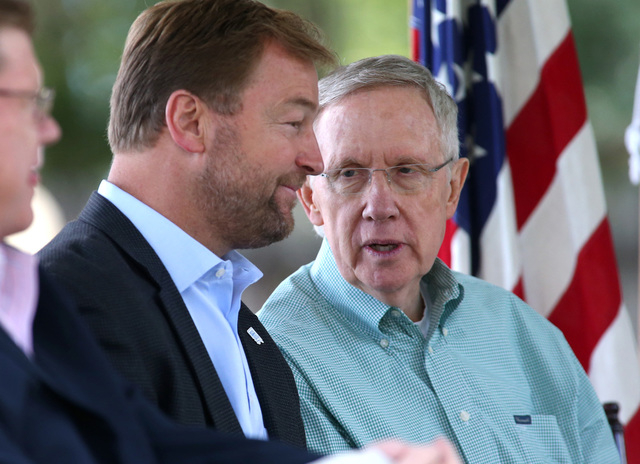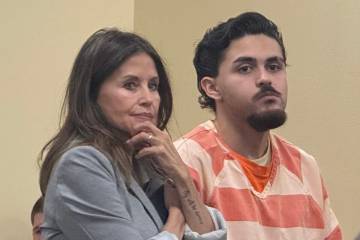Bill would give state power to veto Yucca Mountain
WASHINGTON — A bill introduced Tuesday by four Nevada lawmakers would give the state new veto power over storing nuclear waste at Yucca Mountain.
The legislation would require the governor, affected counties and cities, and affected tribes to sign off before the Nuclear Regulatory Commission could authorize construction of a nuclear waste repository.
The Nuclear Waste Informed Consent Act was written to apply to any state. But Nevada has been at the forefront as pro-Yucca lawmakers have stepped up efforts to revive the Yucca Mountain program terminated in 2010 by the Obama administration.
Rep. Dina Titus, D-Nev., said the Nevadans’ bill “ensures that our voices are heard and respected when it comes to our state’s future.”
Titus and Rep. Joe Heck, R-Nev., sponsored the bill in the House. Sens. Harry Reid, D-Nev., and Dean Heller, R-Nev., introduced it in the Senate.
“No state, including Nevada, should be forced to accept waste against its will,” Heller said.
Reps. Mark Amodei and Cresent Hardy, both R-Nev., were not announced as co-sponsors in a delegation that in the past has spoken with one voice on Yucca Mountain. Their offices did not immediately comment.
The bill envisions a scenario — the NRC poised to approve construction of a permanent nuclear waste site — that could be more than a decade away, if ever.
But it signals that Nevada lawmakers plan to continue fighting if Yucca Mountain re-emerges as the top choice. The Department of Energy spent more than 20 years and $15 billion studying the mountain ridge 100 miles northwest of Las Vegas before the plug was pulled on the project.
“The act introduced today will give a voice to state and local governments and save our country from making another costly mistake like Yucca Mountain,” Reid said.
The veto measure could be unholstered as an amendment if congressional committees get to where they are considering new legislation to turn the green light back on for the Nevada site.
Rep. John Shimkus, R-Ill., a leading advocate of picking up the Yucca project where it left off and trying to make it worthwhile for the state of Nevada to drop its longstanding opposition, said he doubted the veto legislation could succeed.
“This latest gambit stands little chance in the House of Representatives where the Yucca Mountain project enjoys overwhelming, bipartisan support,” Shimkus said. “As we continue to follow the law, I’m eager to work with willing partners at all levels of government to find the right mix of incentives to make Yucca Mountain an asset to both the State of Nevada and the nation.”
The original Nuclear Waste Policy Act gave Nevada a veto over Yucca Mountain, and then-Gov. Kenny Guinn exercised it in April 2002. But Congress overrode the governor’s veto — 306-117 in the House and 60-39 in the Senate.
The new legislation would not give Congress the ability to override a state’s refusal to host a waste site.
Nye County Commissioner Dan Schinhofen, a proponent of restarting Yucca Mountain, said any state ability to veto the project would go against the wishes of the government of the county where the waste would be stored. He said Reid seems to want to ignore laws that are already in place.
“This is another attempt to bypass the Nuclear Waste Policy Act,” Schinhofen said. “If you can get the governor to agree, who’s to say the next governor’s not going to disagree. That is why the Nuclear Waste Policy Act had set up a veto system where the state could object, then by a certain vote of Congress, the Congress could override. And that’s already happened.”
Sen. Lamar Alexander, R-Tenn., who is working on nuclear waste issues as chairman of the Senate energy and water subcommittee, on Tuesday pointed to those votes a dozen years ago and to recently released studies by NRC staff that concluded Yucca Mountain could be safe, with conditions on its use.
“Congress has already approved Yucca Mountain as our country’s current nuclear waste repository, and the Nuclear Regulatory Commission has said we can safely store nuclear waste there for up to one million years,” Alexander said. “Continuing to oppose Yucca Mountain is to ignore both the law and science.”
But Nevada sponsors said their bill is consistent with the policy of the Obama administration and the recommendations of a blue ribbon commission that was formed to develop nuclear waste management strategy after the Yucca program was scrapped.
The commission, whose members included now-Energy Secretary Ernest Moniz, recommended the government seek volunteers to host nuclear waste facilities through a “consent-based” process that could include setting state and local benefits for volunteering.
“The people of Nevada deserve to have a seat at the table in the nuclear waste storage conversation,” Heck said. “Allowing the governor, local government units, and Indian tribes to review proposals and make a determination on the project… will ensure the safety of Nevada’s citizens and our environment.”
Pahrump Valley Times editor Arnold M. Knightly contributed to this report.
















